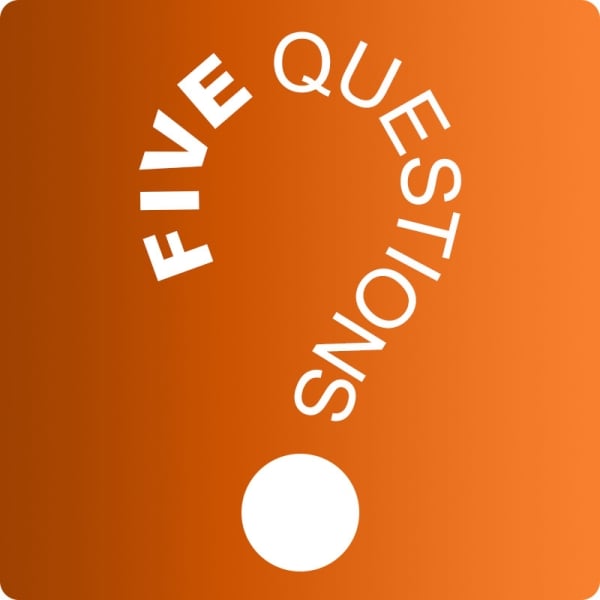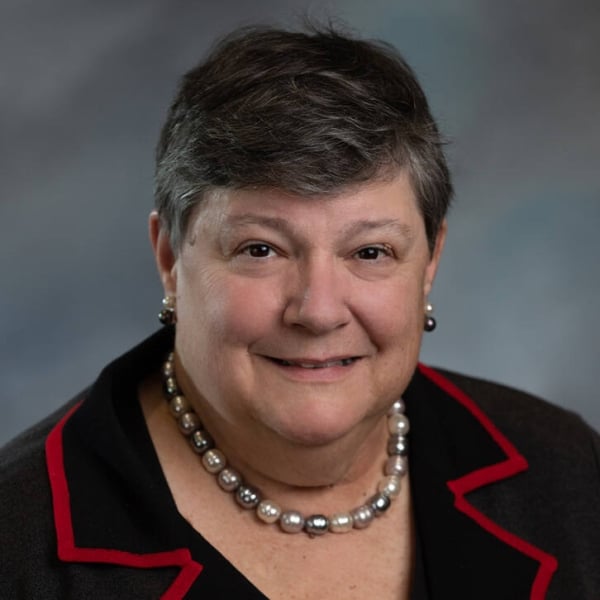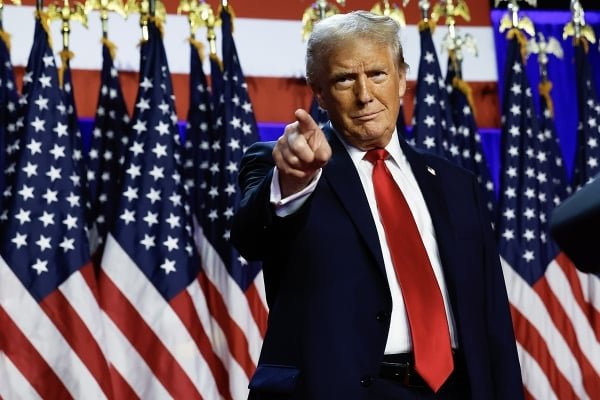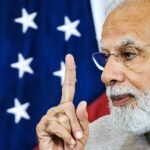Five questions for Trinity Washington’s outspoken president
When Donald Trump was first elected president in 2016, Trinity Washington University president Patricia McGuire didn’t hold back how she felt about his policies. She let him have it—publicly, sharply and often.
The longtime president of the Catholic, minority-serving, predominantly women’s university in Washington, D.C., was an early critic of President Trump at a time when many campus leaders hesitated to wade into the political fray. She frequently critiqued the administration online and in interviews, including in a widely circulated and debated blog post on the university’s website in February 2017, just weeks into the new administration, in which she accused Trump of spreading a “remarkable torrent of false and misleading statements” and waging a “cruel and unreasonable war on immigrants.”
McGuire took aim at Trump’s travel ban on Muslim-majority countries, along with raids and deportations by Immigration and Customs Enforcement. (Trinity Washington has a significant number of undocumented students—roughly 10 percent of full-time undergraduates.)

She also didn’t hesitate to call out one of her own graduates and donors, Kellyanne Conway, a prominent Trump aide at the time, writing that Conway “has played a large role in facilitating the manipulation of facts and encouraging the grave injustice being perpetrated by the Trump Administration’s war on immigrants among many other issues.”
Now the country is headed into a second Trump presidency at a time when many college and university presidents are even more reticent to comment on political matters, burned by backlash to their statements on the Israel-Hamas war and their handling of campus protests. Inside Higher Ed spoke with McGuire on the Friday after Election Day about how she plans to approach Trump’s second term and how she thinks higher ed leaders should respond to what’s bound to be an eventful four years for the sector.
The conversation has been edited for length and clarity.
1. First and foremost, what do you think is in store? How do you think a second Trump presidency might affect higher ed?
I think higher ed has not really thought deeply about a second Trump presidency, so we’re going to have to spend some time in the next two or three months really getting up to speed on what is likely to happen.
Some of what is rumored he will do may not come to fruition. I’m very skeptical about any plan to abolish the Department of Education, mostly because there’s too much money at stake.
I think, instead, the Trump administration would find new and more lucrative ways to manage the student loan system, for example, and perhaps do more private investing and private management of parts of what the Education Department does now. Change once more with Title IX rules is quite likely, and I think that many institutions would actually welcome that, because the Biden administration rules that were issued this year are enormously complicated and expensive to implement. On the other hand, it will result in a loss of protection for many, many students who are victimized by sexual assault, so that is something we’re going to have to watch very, very closely.

I think we will see the effort that we saw with Virginia Foxx’s committee [on education and the workforce] in Congress—the effort to somehow confront, embarrass, tie the hands of elite universities—continue and become even more aggressive. And that will include efforts to reduce the emphasis on diversity, equity and inclusion programs, to challenge our curricula and the academic freedom of our faculty to choose what they teach.
I think higher ed is in for a rough ride. I don’t think we have prepared well for it, so it will be a learning experience for all of us.
2. During Trump’s first term, you were known for being outspoken about his policies. How are you thinking about your leadership during his second presidency?
I may be an even stronger advocate for our students and how they feel at risk, which is where I always start my advocacy. When I speak out, it’s not because I’m just riding some horse for myself. It is on behalf of the students we serve, and here at Trinity, we serve low-income, predominantly women of color and a large number of immigrant students, including undocumented students. And we’re a predominantly Black institution as well as Hispanic-serving.
Yesterday, I had what we call Campus Conversations, which is a virtual town hall that we conduct every so often, and we had over 100 participants join in the election debrief. And what I heard our students say was a great deal of anger, grief, shock, fear and feelings of hopelessness. Students who are immigrants both said and wrote to me they’re very fearful that they might be rounded up for deportation, or worse, that their families will be impacted by the threat of deportation. Even students who are legal immigrants and have different visas are worried that somehow their visas will be called into question.
It’s my job, my duty, to speak out on behalf of these students, to be the voice for them. And it’s part of Trinity’s mission. We’re very social justice–focused in our emphasis, in our mission. We get that from the nuns who founded Trinity.
3. There’s recently been a push toward institutional neutrality in the wake of the Israel-Hamas war. What do you make of that movement and how it might play out in a second Trump era?
I think the institutional neutrality movement is pure folly. I think it is a betrayal of our responsibilities in higher education. And I think it is absolutely miscast to say that if presidents make a statement, that chills everybody else’s right to speak. Oh, come on. I don’t notice anybody being afraid to tell me what their complaints are on any given day, and they are welcome to speak out, too.
I think presidents have a moral leadership obligation. This is not about just getting into the political fray. This is about speaking out on issues that truly are moral in their roots, and the moral issues are the ones that affect our students and communities.
So, to speak out about racial justice, for example, and how the effort to eliminate DEI programs is affecting Black students and other students of color—I think we have a moral obligation to speak out about that and actually to resist that effort. In the same way, if we enroll large numbers of immigrant students, we have an obligation to speak out on their behalf, to study immigration issues and to be advocates for just and fair solutions for them, rather than cowering under our desks and acting like, “Oh, I have to be neutral. If I say something, somebody else is going to be afraid.” Oh, please—my students right now are afraid.
They’re not afraid of me. They are afraid of what might happen to them at the hands of an administration that has promised cruel and unusual acts of mass roundups and deportations. If I don’t speak out about that, what am I doing in this job? If higher education can’t confront the abuses of any political administration, whether it’s a Biden administration or a future Trump administration, who will? We are the counterweight to government. That is why we have academic freedom. We need to be role models to teach our students and our faculties how to speak out with moral courage and conviction.
4. Expanding on that, what do you think higher education leaders’ role should be right now? How could or should they be responding to the changes that might be ahead?
The first thing we need to do is call our campus communities together and listen to what our communities are saying and feeling—students, faculty, staff.
I was amazed in my gathering yesterday how many staff people were absolutely grief-stricken, some of them even in tears. We think of our students, but we don’t think of our staff sometimes, and they’re the ones who are out on the front lines with our students, whether it’s in the counseling center or advising or even in food service. So, it’s listening to what their concerns, their fears, their hopes, their dreams are, then saying to all of them—students, faculty, staff—how do we go forward together with effective mechanisms to keep our own sanity, to keep our faith and to do what we do best?
The thing that higher ed does best is teach and learn. And if we believe in our business, we have to believe that education is the great antidote to authoritarianism, that through education, we will work our way through the current political environment to a place that will be better for everyone. The moral question is, how do we use the levers at our disposal—which are education, learning, research, really good dialogue—to continue to challenge the American community, the American democracy, to live up to its ideals?
But we have to do it together. I can’t sit in my office as president and say, “OK, I know what’s best for my students or my staff.” I have to ask them. Right now, what I’m hearing them say is they are looking for advocacy. They want to hear that their leaders on this campus are also going to be voices on their behalf.
If the universities collapse in on themselves, if the Trump administration is successful in debilitating higher education, there is little hope for this democracy. I do believe we’re the last best hope to be sure that democracy stays on course for the future.
5. You touched on this, but how are your students and staff responding? What do they want from you and other campus leaders?
On my campus, with a number of undocumented students, they want and need advice on what happens if one of their family members gets rounded up for deportation. They are afraid about whether they’ll be able to stay in school, and they need assurance that we will help them to stay in school, both financially and from a family perspective.
With so many Black students on our campus also, who are feeling the sting of so much racial hatred, they want to know that there is a safe space here for them, that what they are experiencing in the larger society, they can not only find some relief from but that they can get some concrete strategies to cope with that. We have to continue all of our racial equity initiatives.
The faculty and staff issues are slightly different. Staff want to know that we are caring for them as whole people. They want to know that if they need to take a day off because they’re just feeling overwhelmed, that’s OK. They also want places where they can come together and talk about their upsets and fears. They also want some very specific pointers on how to talk to students about these issues. Faculty are perhaps the most exposed to student needs. And faculty are experiencing fear and burnout also.
And this gets back to the role of the president. I think the most important thing presidents can do for faculty is to be public ardent activists on behalf of academic freedom and give them the widest possible scope to do what they do best, which is to teach, do research and work with students. And I think faculties who feel that their presidents have their back on academic freedom will feel a lot more secure.
That’s where the neutrality problem comes up again. That’s why we need to be vocal and out in front.
You may be interested

Dulce, Mexican ‘Muñeca’ Singer, Dead at 69
new admin - Dec 26, 2024[ad_1] Mexican romantic music singer Dulce has died. On Christmas day, the family of the Eighties pop star, behind hits…

Heat president Pat Riley shuts down Jimmy Butler trade rumors, addressing ‘distraction’ head on
new admin - Dec 26, 2024[ad_1] The Jimmy Butler trade rumors have gotten to the point where Miami Heat president Pat Riley needed to step…

What to know about the newest bills Biden signed into law
new admin - Dec 26, 2024What to know about the newest bills Biden signed into law - CBS News Watch CBS News President Biden celebrated…




































